This article refers to the Barracuda Message Archiver firmware version 5.2 or higher, and the Barracuda Archive Search for Outlook version 5.2 or higher installed on Windows Vista and Windows Server 2008. Archive Search for Outlook supports Microsoft Outlook versions 2013, 2016, 2019, 2021, and Outlook for Microsoft 365.
Note the following are not supported by Archive Search for Outlook:
- Outlook for Mac versions
- New version of Windows Mail, Outlook for Windows
Verify the Archive Search for Outlook version (available for download on the USERS > Client Downloads page in the Barracuda Message Archiver web interface) is the same major revision as the Barracuda Message Archiver firmware for proper functionality.
Locale
The language for Archive Search for Outlook options is determined by your Microsoft Office installation locale; supported languages include:
- DE - German
- EN - US English
- ES - Spanish (Continental)
- FR - French
- IT - Italian
- JP - Japanese
- NL - Dutch
- Polish NL
- Chinese
Step 1. Install the Deployment Kit
Use the following steps to install the Archive Search for Outlook Deployment Kit.
- Log in to the Barracuda Message Archiver as an administrator.
- Navigate to the USERS > Client Downloads page, and download the Barracuda Archive Search for Outlook Deployment Kit to the local system running Windows Vista or Windows Server 2008.
- Double-click the .msi file to launch the Barracuda Archive Search for Outlook Deployment Kit Setup Wizard:
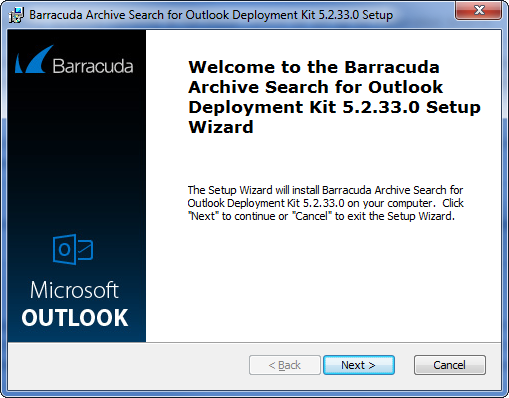
- Click Next. Select the installation folder, for example, C:\Program Files\Barracuda\Message Archiver\Archive Search for Outlook Deployment Kit.
- Click Next. Read and accept the license agreement.
- Click Next to begin the installation.
- When the installation is complete, click Finish.
- The following deployment kit content is installed in the selected directory:
- 64-bit Installer
- 32-bit Installer
- Administrator module (includes ADMX files and locale-specific ADML files)
Step 2. Configure Archive Search for Outlook
Use the following steps to configure Archive Search for Outlook:
- Go to the installation location, and open the ADMX folder, for example:
C:\Program Files\Barracuda\Message Archiver\Deployment Kit\ADMX Copy the ADMX and ADML locale directories to the PolicyDefinitions folder on your system, for example:
%systemroot%\sysvol\domain\policies\PolicyDefinitions
Start the Group Policy (GPO) Editor for the domain where you will be installing the tool. You can edit the default policy or create a new policy object and link it to the desired container, for example, the particular OU containing the computers of users that will be using the tool.
- In the GPO editor, navigate to User Configuration\Administrative Templates\Barracuda\Message Archiver, and expand the Archive Search for Outlook node.
Double-click the URI of your Barracuda Message Archiver policy, and select Enabled.
In the Options section, enter the fully qualified URI that Outlook users are to use to access the Barracuda Message Archiver, e.g., https://archiver.mycompany.com:443
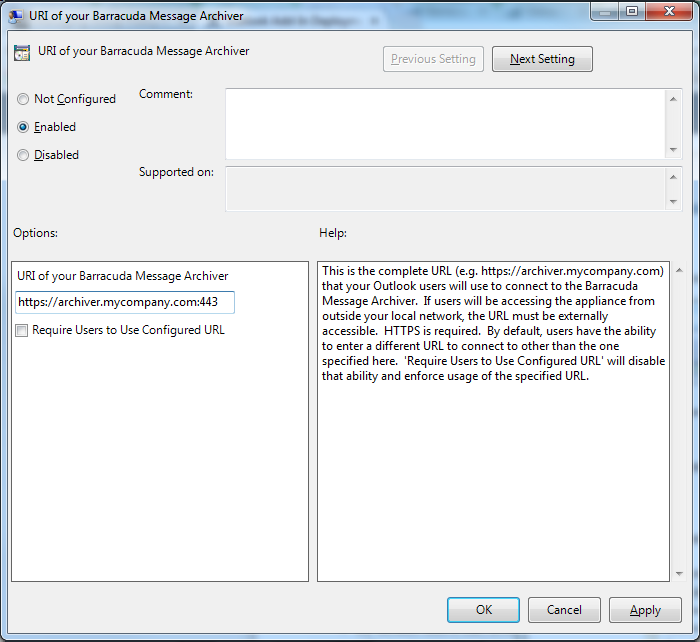
Click Apply. Configure other settings as required, and then click OK to configure the policy. For an explanation of the available settings, click the Extended tab in the policy.
Step 3. Deploy the MSI File
If you do not already have a network share for GPO software deployment, you must create one. The share must be accessible from all of the machines on which the software is to be deployed. The permissions for the share must give read access to the "Everyone" group, and the permissions for the underlying NTFS folder must give read access to the "Authenticated Users" group.
- Copy the .msi file(s) to the share you created in the previous step.
- Open the GPO Editor for the organization that is to use Archive Search for Outlook, for example, the default domain policy.
Either edit the default policy, or create a new policy object, then link it to the desired container. For example, the particular OU containing the computers on which Archive Search for Outlook is to be installed.
In the GPO, navigate to Computer Configuration > Policies > Software Settings > Software Installation:
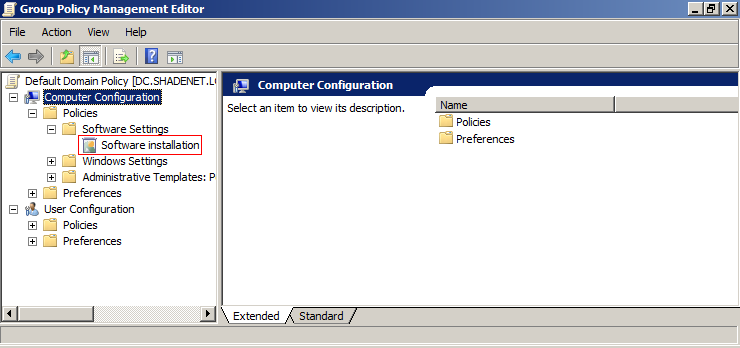
- Right-click Software Installation, point to New, and click Package:
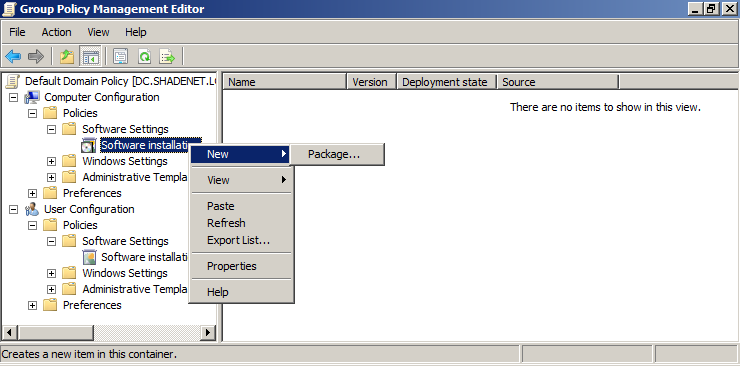
- Enter the UNC path to the .msi file located in the shared folder. For example, enter: \\fileserver\deploy
- Click Open. In the Deploy Software dialog box, click Assigned:
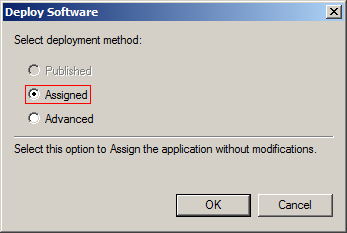
- Click OK. The policy displays in the GPO Editor window:
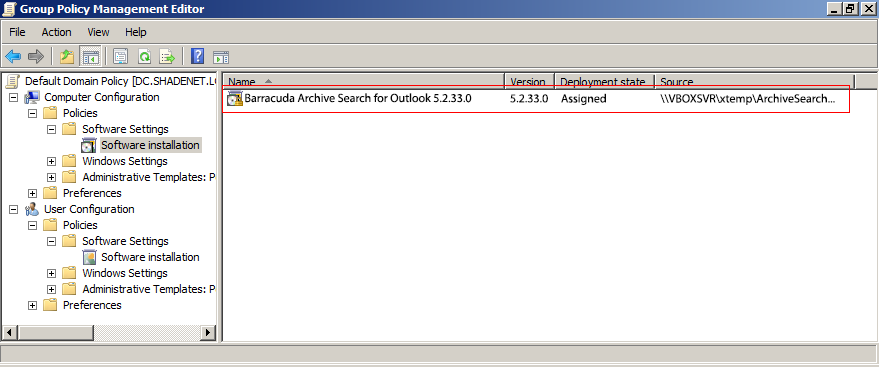
Deploying Archive Search for Outlook to Machines with 64-bit Windows and 32-bit Outlook
If any of the machines in your environment have a 64-bit version of Windows installed but are using a 32-bit version of Outlook, you must deploy the 32-bit MSI to these machines. If you are also deploying the 64-bit MSI for machines with both 64-bit Windows and 64-bit Outlook, then both software deployment policies will apply to the machines with 32-bit Outlook, which will result in both MSIs being installed on these machines. Since Outlook only loads the add-In that matches its bitness, this should not cause any problems.
- In the GPO Editor, navigate to Computer Configuration > Policies > Software Settings, and click Software Installation.
- Right-click 32-bit Barracuda Archive Search for Outlook, and click Properties.
- Click the Deployment tab, and click Advanced. In the Advanced deployment options section, select Make this 32-bit X86 application available to Win64 machines:
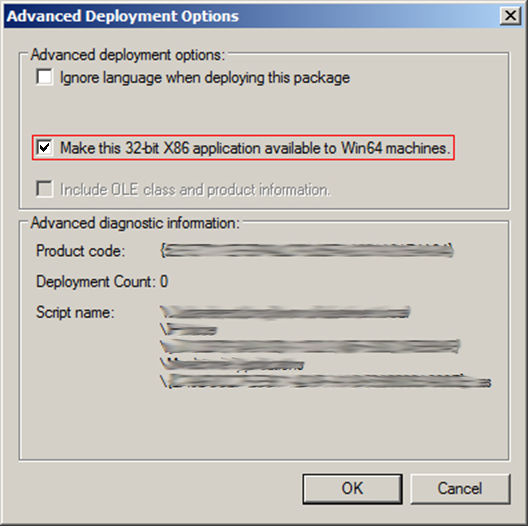
- Click OK. In the Properties dialog box, click Apply, and click OK to to save your settings and close the dialog box.
Test the Deployment
Complete the following steps to test Archive Search for Outlook deployment.
- Restart a computer that is joined to the domain.
- Verify that the tool is installed when you log in, and that the configured policies are applied.
Notify Users
Once the MSI file is successfully deployed, send the Archive Search for Outlook access details to your users. For additional resources, refer to the following Barracuda Campus articles:
- Installing and Configuring Barracuda Archive Search for Outlook
- How to Search and Archive Messages Using Barracuda Archive Search for Outlook
Troubleshooting
Following is a list of troubleshooting tips:
- A common cause of failure is that the user and/or the user's computer does not have adequate access to the share location. Verify that all access and network privileges are configured appropriately.
- Verify you are running the latest Barracuda Message Archiver firmware and Archive Search for Outlook client versions.
- Verify that the software deployment policy defined in Step 3. Deploy the MSI File was created for computers, not users, and that Assigned was selected in the Deploy Software dialog box.
- Additional error messages are available in the Event Log on the domain computer; if you do not find the desired information in the Event Log, consider enabling verbose logging and restarting the computer.
- For additional information on fixing Group Policy issues, see Microsoft TechNet article Fixing Group Policy problems by using log files.
